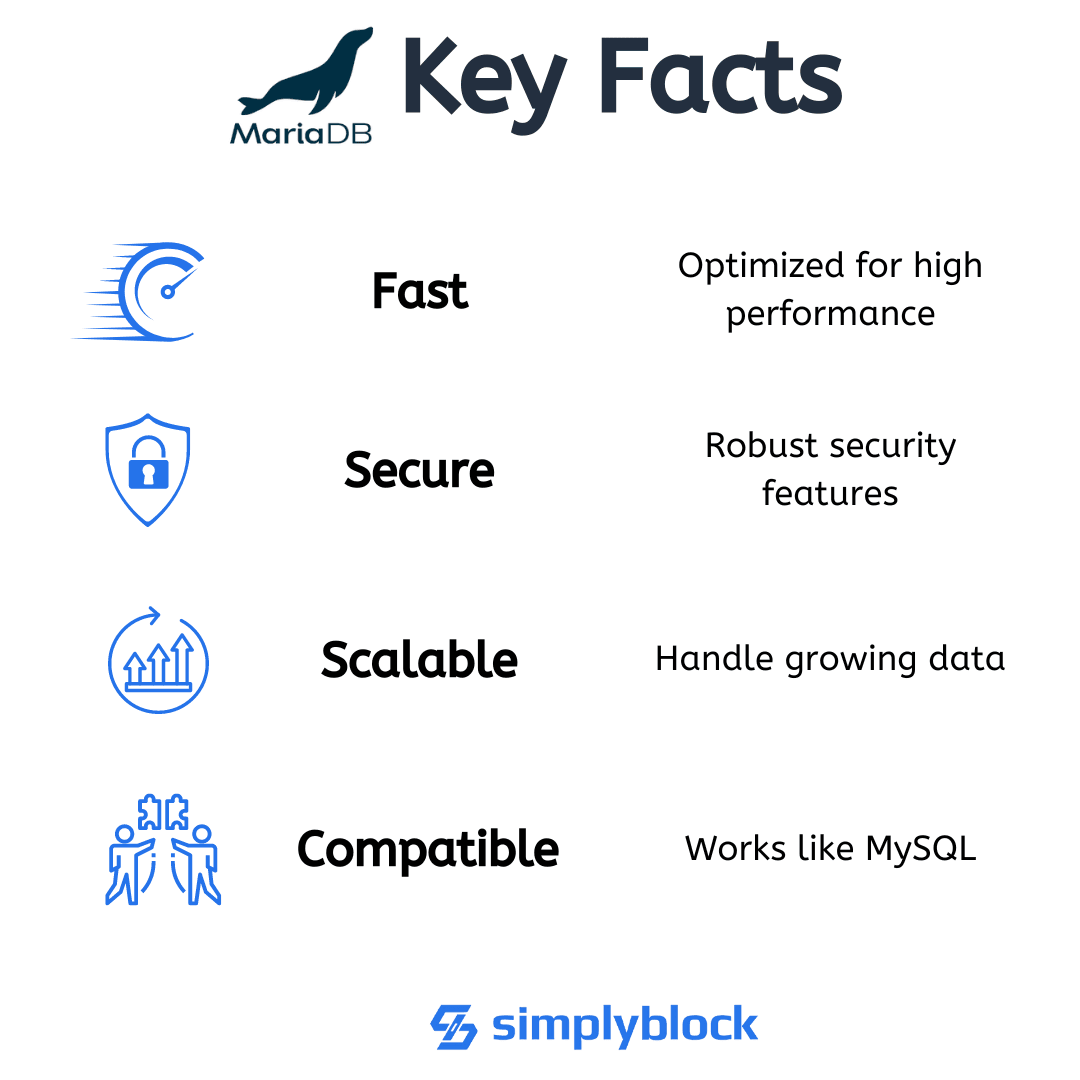MariaDB
Terms related to simplyblock
MariaDB is an open-source relational database management system (RDBMS) originally created as a drop-in replacement for MySQL. It was developed by the original creators of MySQL after concerns about Oracle’s acquisition of the MySQL project. Designed for performance, scalability, and security, MariaDB remains fully compatible with MySQL at the API and protocol levels but has evolved with its own feature roadmap and performance optimizations.
As an enterprise-grade database engine, MariaDB powers critical systems across industries ranging from telecoms to banking. It supports traditional transactional workloads as well as modern analytical use cases.
Key Features of MariaDB
MariaDB brings SQL capabilities with enterprise-level enhancements, including:
- Pluggable Storage Engines: Supports multiple storage engines like InnoDB, Aria, MyRocks, ColumnStore, and Spider.
- SQL Compliance: Implements extensive support for ANSI SQL and stored procedures.
- JSON and Dynamic Columns: Allows semi-structured data in relational schemas.
- Temporal Tables: For auditing and point-in-time queries.
- Data-at-Rest Encryption: Native encryption for tablespaces, redo logs, and temporary files.
- Replication & Clustering: Includes master-slave, multi-source, and Galera Cluster for high availability.
It also supports parallel query execution, thread pooling, and query optimization, making it suitable for both OLTP and OLAP scenarios.

MariaDB vs MySQL and PostgreSQL
MariaDB remains compatible with MySQL 5.x, but over time, it has developed its own identity. Unlike MySQL, MariaDB remains entirely open-source with no proprietary licensing model.
Comparison Table
| Feature | MariaDB | MySQL | PostgreSQL |
|---|---|---|---|
| License | GPL v2 | Dual (GPL + commercial) | PostgreSQL License |
| JSON Support | Dynamic Columns | Native JSON | Native JSONB |
| Storage Engines | Multiple (Pluggable) | Primarily InnoDB | Single (native) |
| Parallel Query Execution | Yes | Limited | Yes |
| Temporal Tables | Yes | No | Yes |
| Replication | Galera, Master-Slave | Master-Slave | Streaming Replication |
MariaDB stands out for hybrid use cases requiring structured and semi-structured data support with horizontal scalability via pluggable engines.
Use Cases of MariaDB
MariaDB is adopted across enterprise environments for a broad range of applications:
- Web Applications: Powers content management systems and ecommerce platforms.
- Financial Services: Handles transactional operations and compliance with high availability.
- Edge and Embedded Systems: MariaDB’s lean server footprint supports IoT and industrial applications.
- Cloud-Native Platforms: Offers container support and works with orchestration tools like Kubernetes.
- Data Warehousing: ColumnStore engine enables real-time analytics and hybrid transactional/analytical processing (HTAP).
For high-performance deployments on Kubernetes, pairing MariaDB with simplyblock™ ensures consistent, low-latency, and fault-tolerant storage across clusters.
Storage and Performance Considerations
MariaDB’s performance is closely tied to the underlying storage. Engines like InnoDB benefit from NVMe and NVMe over TCP-enabled infrastructure, delivering high IOPS and consistent throughput for transactional workloads.
When deployed on software-defined storage solutions like simplyblock, organizations gain:
- Sub-millisecond latency for OLTP
- Advanced erasure coding for efficient redundancy
- Thin provisioning for flexible capacity
- Kubernetes CSI support for dynamic volume provisioning
- Copy-on-write snapshots for fast backups and disaster recovery
These capabilities allow MariaDB to scale efficiently without storage becoming the bottleneck.
MariaDB in Kubernetes and Cloud Environments
MariaDB runs natively on Kubernetes and integrates with tools like Helm, Operators, and Persistent Volumes for stateful workloads. When deployed with high-performance storage like simplyblock for Kubernetes, MariaDB benefits from:
- Dynamic volume provisioning
- Cross-zone failover
- Automated scaling of storage tiers
- Workload isolation via multi-tenancy QoS
For hybrid cloud and edge environments, MariaDB can replicate to centralized clusters using async or semi-sync replication, keeping remote data synchronized while minimizing WAN dependency.
Related Terms
Teams often review these glossary pages alongside MariaDB when they plan HA and durability for NVMe/TCP, Kubernetes Storage, and Software-defined Block Storage.
TiDB
CockroachDB
Write-Ahead Logging (WAL)
Replication
Interbase
Questions and Answers
MariaDB is a community-driven fork of MySQL designed to remain open source, with better performance in some scenarios and more storage engines. It’s fully compatible with MySQL, making migration simple, and it’s often chosen for its transparency, innovation, and long-term support model.
Yes, MariaDB runs well in Kubernetes, especially with StatefulSets and persistent volumes. For high performance and resilience, it pairs best with Kubernetes-native NVMe storage solutions like Simplyblock, enabling fast failover and secure, scalable storage.
To boost performance, combine MariaDB with NVMe storage for lower latency and faster IOPS. Tune your buffer pool, query cache, and use connection pooling for large-scale read/write operations. Also consider a storage backend that supports parallel I/O.
Yes, MariaDB supports table-level and tablespace-level encryption. For enhanced security, pair it with storage-level data-at-rest encryption, ensuring tenant isolation and compliance with GDPR or HIPAA when running in multi-user environments.
MariaDB is ideal for transactional applications, analytics, and hybrid OLAP/OLTP workloads. It fits perfectly with cloud-native, containerized apps, especially when integrated with Simplyblock’s software-defined storage for better performance, scalability, and cost control.
